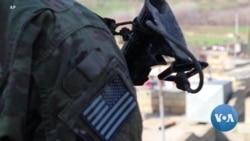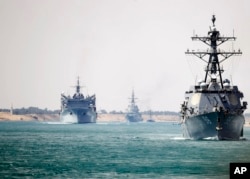Nike Ching contributed to this report from the State Department; Carla Babb contributed from the Pentagon.
CAPITOL HILL — The United States on Wednesday ordered its non-emergency employees to leave Iraq, as American lawmakers worried openly about a potential march to war with Iran.
The drawdown of personnel at the U.S. Embassy in Baghdad and America’s consulate in Irbil came as the Trump administration warned of potential threats against American forces in the Middle East from Iran or Iranian-backed proxies.
"This threat stream, let me tell you, is real," said a senior State Department official on Wednesday. "This is an imminent threat to our personnel."
WATCH: Trump's Military Brinkmanship, Reluctance to Enter Conflict
"I've seen all the intelligence because I have people on the ground. I have political officers in Syria, I have people going in and out of Iraq working with our military there. So I'm concerned, as it is all of us," added that official.
Another senior State Department official said the threats were "directly linked to Iran — multiple threat streams directly linked to Iran."
The move sparked sharp reactions on Capitol Hill.
“There are only two reasons for ordering their departure: We have credible intelligence that our people are at risk, or in preparation for military action in Iran,” the Senate Foreign Relations Committee’s top Democrat, Robert Menendez of New Jersey, said. “The Trump administration has not provided any information to this committee on the intelligence behind their decisions or what they plan to do in Iraq or Iran.”
Menendez demanded the Trump administration bring the panel’s members up to date on “any plans to go to war with Iran.”
A senior State Department official said the Trump administration was not aiming to launch a war with Iran.
"I would say every single contact I have had with the most senior people in the U.S. government indicates that there is absolutely no desire or interest in a military conflict with anybody," he said.
Responding to top European Union officials' concerns about whether the U.S. may be stumbling into war, a State Department official said Washington was asking its European allies to help to calm the situation, a message requested by Secretary of State Mike Pompeo in his recent meetings with foreign ministers from Britain, France, and Germany.
"We asked them to use their influence with the Iranian regime to explain that they need to de-escalate.That's the message, that was the request," said a senior State Department official.
On Capitol Hill, Senate Foreign Relations Committee Chairman James Risch of Idaho said he'd been briefed on the unfolding situation in the Middle East and that a briefing of the full Senate was "in the works."
The United States is not alone in curtailing activities in Iraq. Germany and the Netherlands said they were suspending military training operations in the country, although Berlin said it had no signals of its own that a threat against Western interests in Iraq was imminent. The Dutch government cited an unspecified security threat in curtailing its training operations.
U.S. President Donald Trump on Tuesday rejected a report that he was considering sending 120,000 troops to counter Iran, but didn't rule out deploying "a lot more" soldiers in the future.
"I think it's fake news," Trump said of a New York Times report that the White House was considering a plan to send 120,000 troops to the region.
"Now, would I do that? Absolutely. But we have not planned for that," Trump said.
On Wednesday, the president took to Twitter to reject what he said were reports of "infighting" regarding his Middle East policy.
"All sides, views, and policies are covered. I'm sure that Iran will want to talk soon," he tweeted.
The Pentagon has already dispatched an aircraft carrier and nuclear-capable bombers to the region in the last few days, with a Patriot missile battery and a landing platform dock ship on the way. The Patriot system offers protection from aircraft and missiles, while the LPD carries Marines and the aircraft, hovercraft or boats needed to put them ashore to fight in distant places.
But a major U.S. ally in the region, the United Arab Emirates, said it would show "restraint" in the face of Iranian aggression.
The U.S. suspects Iran was behind the sabotage of four foreign vessels Sunday off the UAE coast. Two Saudi oil tankers were among those damaged.
"We need to emphasize caution and good judgment," UAE Minister of Foreign Affairs Anwar Gargash said Wednesday. "It is easy to throw accusations, but it is a difficult situation. There are serious issues and among them is Iranian behavior."
But he said the UAE would not publicly speculate about who was behind the sabotage while the investigation was under way.
Meanwhile, a senior officer in the U.S.-led military coalition combating Islamic State said Tuesday that he had seen no greater recent threat to its troops in Iraq or Syria from forces backed by Iran.
"There's been no increased threat from Iranian-backed forces in Iraq and Syria," British Maj. Gen. Chris Ghika told reporters at the Pentagon in a video conference from coalition headquarters in Baghdad. "We're aware of their presence, clearly, and we monitor them, along with a whole range of others, because that's the environment we're in."
The statement was in contrast to comments from the Trump administration and the Pentagon, who have asserted for more than a week that they have detected potential Iranian threats against U.S. forces in the Middle East.
Such assertions face increasingly rigorous scrutiny from lawmakers.
“This seems like an escalation with no endgame,” Democratic Sen. Chris Murphy of Connecticut said, describing the pressure campaign on Tehran as “ham-handed.”








